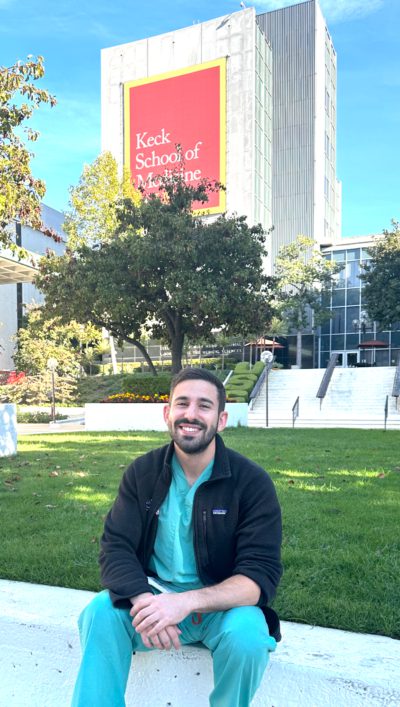By: Mollie Barnes
For Ido Badash, MD, the key for medical students to finding success in residency is to choose a place where one can see themselves thriving with plenty of opportunities to reach one’s full potential.
Dr. Badash would know, he’s in his fourth year of residency at the USC Caruso Department of Otolaryngology – Head and Neck Surgery. While attending medical school at the Keck School of Medicine of USC, he initially thought he would be interested in plastic surgery. However, once he did a rotation in otolaryngology, he knew he had found his place.
“I ended up falling in love with otolaryngology,” he said. “I love the improvements to quality of life that we’re able to make for our patients, as well as the variety of surgical procedures and medical treatment options we can provide.”
People Bring the Most Meaning to the Program
The people also help. During his rotations, he felt that the faculty really provided an excellent environment for training due to their kindness. That also contributes to the high volume of residents coming in from the Keck School to continue with their residency.
“It’s a sign of how appealing the program is for medical students here, who can see firsthand how great the culture, the environment and the support is from the institution and the faculty,” Dr. Badash said.
Some of his key mentors are doctors John Oghalai, MD; Tamara Chambers, MD; Bozena Wrobel, MD; Michael Johns, MD; and Kevin Hur, MD, but he said everyone on the faculty has contributed to his education and love for the program in some way.
“You want to have people around you who will push you to be better, and to help you in your low times to get back on your feet,” Dr. Badash said. “During my time at medical school at USC, I saw many appealing things about this program. I personally experienced the positive culture between the attending surgeons, the residents, and the students. All of that contributes to the positive, collaborative environment that encourages education and teamwork. I knew I wanted to be a part of that.”
Seeing the confidence of fifth-year residents helped him decide to choose the USC Caruso Department of Otolaryngology – Head and Neck Surgery as his program, too.
“I saw how skilled the residents were, especially by the time they were finishing residency,” he said. They were confident, courageous, skilled, and just generally excellent doctors and surgeons. So I realized that it was an exceptional training environment.”
One of the other best parts of the residency program, Dr. Badash said, is the opportunity to serve the diverse patient population at Keck Medicine of USC and the Los Angeles General Medical Center.
“I find it extremely meaningful to be able to care for underserved patients who don’t have access to regular otolaryngology care, especially high-level care like we provide,” Dr. Badash said.
Many Opportunities for Clinical and Research Training
Throughout his time at USC, Dr. Badash has been able to start from basically no knowledge of otolaryngology care to get to the point now where he feels confident seeing his own patients from diagnosis through to surgery.
“They give us graduated responsibility in the operating room, allowing us to build up the skills we need to be able to care for our own patients,” he said. “There’s not much exposure to otolaryngology in medical school, so we basically started from nothing.”
During residency, Dr. Badash was also awarded two research grants, from the Centralized Otolaryngology Research Efforts (CORE) and the Clinical and Translational Science Institute (CTSI) of USC, for his research on developing non-invasive diagnostic modalities for sinonasal disorders. During his medical school and residency training, he became experienced in utilizing optical coherence tomography in Dr. Oghalai’s laboratory. Combining this experience with his interest in sinonasal disorders, he saw an optimal intersection and opportunity to use this technology to advance clinicians’ abilities to diagnose eosinophilic sinusitis.
And when Dr. Badash sees an opportunity to contribute to science, he usually takes it.
“Whenever I spot an opportunity, especially within my areas of interest, I always capitalize on it. I don’t let things pass me by, because I’ve found that by jumping on these opportunities, good things have always happened. And I’ve been very satisfied with the kind of contributions I’ve been able to make to the field of otolaryngology, and ultimately to my own education and self-actualization of becoming the best person, and best clinician, that I can be.”
